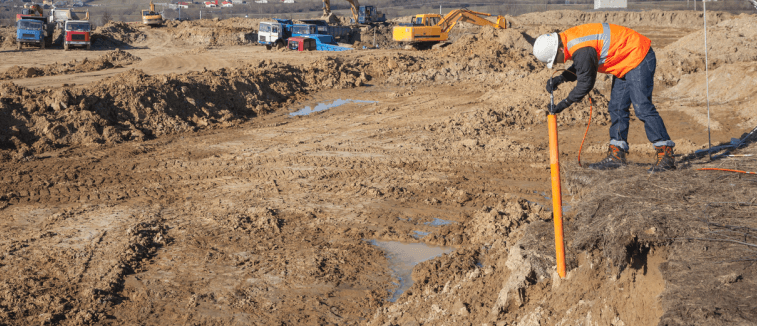4 Easy Facts About Geotheta Described
4 Easy Facts About Geotheta Described
Blog Article
Geotheta - Truths
Table of ContentsIndicators on Geotheta You Should KnowThe 25-Second Trick For GeothetaGeotheta Can Be Fun For AnyoneLittle Known Facts About Geotheta.The Main Principles Of Geotheta

They carry out website investigations, accumulate samples, do lab examinations, and assess data to examine the viability of the ground for building and construction jobs - Geo Tech Engineering. Based upon their searchings for, geotechnical designers provide referrals for foundation layout, slope security, retaining structures, and reduction of geotechnical dangers. They work together with other specialists, such as architects, architectural designers, and building and construction teams, to make sure that geotechnical factors to consider are integrated into the overall job style and execution
By evaluating the habits and properties of soil and rock, they can recognize possible geotechnical risks such as landslides, soil settlement, or incline instability. Their proficiency aids protect against failures or accidents that can endanger lives and property. Below are some detailed tasks and obligations of a geotechnical engineer: Website Examination: Geotechnical designers conduct website examinations to gather information on subsurface conditions.
They translate the information to understand the homes and habits of the soil and rock, including their stamina, permeability, compaction characteristics, and groundwater conditions. Geotechnical Analysis and Style: Geotechnical designers assess the data collected throughout site investigations to examine the security and suitability of the website for building and construction jobs. They do geotechnical computations and modeling to evaluate variables such as birthing ability, negotiation, slope stability, side planet pressures, and groundwater circulation.
Geotheta Can Be Fun For Everyone
Foundation Design: Geotechnical engineers play a critical role in making foundations that can securely support the designated framework. They assess the dirt conditions and lots requirements to establish the appropriate foundation kind, such as shallow foundations (e.g., footings), deep foundations (e.g (https://geotheta.start.page)., heaps), or specialized techniques like dirt improvement. They consider aspects such as settlement limits, birthing capacity, and soil-structure interaction to create optimum foundation styles
They evaluate construction strategies, monitor website activities, and perform area assessments to verify that the design referrals are complied with. If unpredicted geotechnical problems arise, they examine the scenario and provide referrals for remediation or changes to the design. Risk Analysis and Mitigation: Geotechnical engineers examine geotechnical hazards and threats connected with the project site, such as landslides, liquefaction, or soil erosion.

Collaboration and Interaction: Geotechnical designers function closely with various other professionals associated with a task, such as architects, structural engineers, and building and construction groups. Efficient communication and collaboration are necessary to incorporate geotechnical considerations into the total job layout and construction process. Geotechnical designers give technical expertise, response inquiries, and ensure that geotechnical demands are fulfilled.
The 10-Second Trick For Geotheta
Here are some kinds of geotechnical engineers: Foundation Engineer: Structure designers focus on developing and analyzing structures for frameworks. They examine the soil conditions, lots needs, and website qualities to determine one of the most ideal foundation type and design, such as superficial foundations, deep structures, or specialized methods like heap foundations.
They examine the aspects influencing incline stability, such as dirt buildings, groundwater conditions, and incline geometry, and establish approaches to stop slope failings and alleviate dangers. Quake Engineer: Quake designers concentrate on examining and creating frameworks to stand up to seismic forces. They evaluate the seismic hazard of a website, examine soil liquefaction possibility, and establish seismic style standards to guarantee the safety and strength of frameworks throughout earthquakes.
They do area screening, collect examples, and examine the gathered data to identify the soil properties, geologic developments, and groundwater conditions at home a website. Geotechnical Instrumentation Engineer: Geotechnical instrumentation designers focus on monitoring and determining the behavior of soil, rock, and frameworks. They set up and maintain instrumentation systems that keep an eye on factors such as soil negotiation, groundwater levels, incline motions, and architectural displacements to analyze efficiency and offer very early cautions of prospective issues.
The Facts About Geotheta Uncovered
They carry out tests such as triaxial examinations, debt consolidation examinations, straight shear examinations, and permeability examinations to gather information for geotechnical evaluation and style. Geosynthetics Engineer: Geosynthetics engineers concentrate on the style and application of geosynthetic materials, such as geotextiles, geogrids, and geomembranes. They make use of these products to enhance dirt security, enhance slopes, offer drain remedies, and control erosion.
They have a tendency to be investigative individuals, which implies they're intellectual, introspective, and curious. They wonder, systematic, rational, logical, and sensible. Several of them are additionally social, suggesting they're kind, generous, cooperative, client, caring, helpful, empathetic, tactful, and pleasant. Does this seem like you? Take our complimentary occupation examination to learn if geotechnical designer is just one of your leading occupation matches.
In the workplace atmosphere, geotechnical designers make use of specialized software program devices to carry out calculations, create layouts, and evaluate data. They prepare reports, review task requirements, interact with clients and group members, and coordinate project tasks. The office setup gives a favorable environment for study, evaluation, and collaboration with various other professionals entailed in the job.
Some Known Questions About Geotheta.
They often see project websites to perform site investigations, examine geotechnical problems, and collect information for evaluation. These sees involve traveling to different places, in some cases in remote or difficult surfaces. Geotechnical designers might execute soil sampling, conduct examinations, and display construction tasks to ensure that the geotechnical aspects of the project are being applied correctly.
Geotechnical designers also work in specialized geotechnical laboratories. In these facilities, they carry out experiments, do tests on dirt and rock examples, and assess the engineering buildings of the products. Geotechnical research laboratory designers function thoroughly in these settings, managing screening devices, running tools, and recording information. They collaborate with various other laboratory team to guarantee accurate and dependable testing results.
Report this page